Dragon Age: The Veilguard's Mage class reworks the classic fighting style and gives you not just more ways to use flashy elemental attacks, but more ways to control and debilitate your enemies as well.
Dragon Age: The Veilguard's Mage has two distinct fighting styles and can inflict a range of debuffs and status ailments on enemies that you can either let linger over time to make the fight easier or detonate in a single burst that takes a chunk out of their HP.
This Dragon Age: The Veilguard Mage build guide lists the best skills, weapons, and enchantments for the Mage, points out essential passives, and presents some general advice for how to play Mage.
On this page:
Mage has two fighting styles, but both have access to the same skills. The first style uses a stave with a light attack that flings magical energy at a single opponent and a heavy attack that sends a wave of energy out from you. That wave's range is short, so bear that in mind when deciding to use the stave's heavy attack. The stave also generates a magical shell around you when you guard.
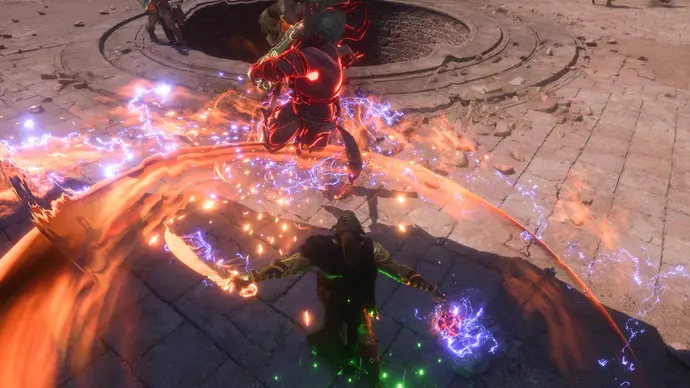
The second style is orb and dagger. The Mage's light attack sends an elemental orb out that deals damage and stacks Arcane Marks on the target. The heavy attack slashes with the dagger, and, if the opponent has three bomb stacks, it triggers a detonation that deals increased damage. Orb and dagger is a faster style that deals more damage to more targets, though its guard is much less effective at deflecting attacks.
Mage abilities all have an elemental alignment, and some skills inflict Primer debuffs as well, such as Weakened or Overwhelmed. It's a class that blends well with other companions, and since a good Mage build gives you access to several elements, you can get around most resistances as well.
Mages have a ranged attack you can activate by holding R2/RT or the corresponding key on your keyboard, and these ranged attacks deplete enemy barrier health. Barrer is the blue health bar you often see on enemies with ranged attacks, and if you strike barriers with non-ranged attacks of your own, they deal significantly less damage. Ranged attacks use mana, so plan carefully.
We settled on a Mage build that prioritizes fire and lightning skills, which gives you access to damage-over-time with burning and increased stagger potential from the shock effect. It also includes two Primer effects - Weakened, from an optional necromancy spell, and Overwhelmed, from both lightning spells. It's a flexible build without much overlap between companions, which leaves you free to bring whomever you like along without having to worry about specific skill distributions on their part.
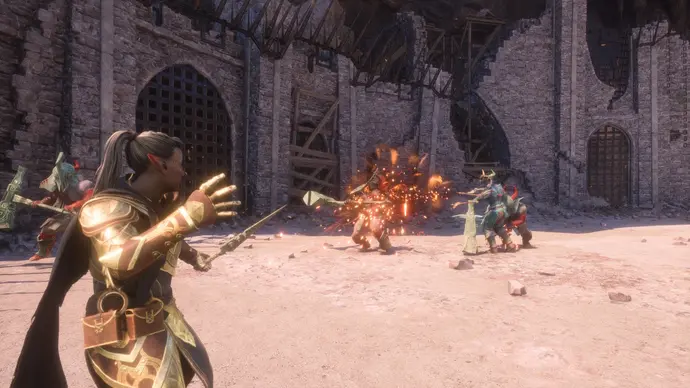
Just don't forget to let your Primer effects linger for a while before having an ally Detonate them. Weakened reduces how much damage enemies deal, and Overwhelmed makes them take more stagger damage, both of which can give you a helpful advantage in tougher fights.
Veilguard's max Level is 50, so whatever specialization you choose, you'll have plenty of points to spend in the core mage trees and the chance to concentrate on specific elements or ailments. Veilguard's broad range of companion abilities means you can create a viable build out of whatever skills you enjoy using, though some skills have broader utility than others.
One of the most important things to keep in mind while working on your build is that you never want to specialize in a single element. If you go into battle with three fire skills and end up facing enemies with fire resistance, you're in for a tedious, lengthy fight, especially if you bring allies such as Davrin and Taash along. Have at least one alternate element on hand, and try to avoid doubling up on elements with your companions.
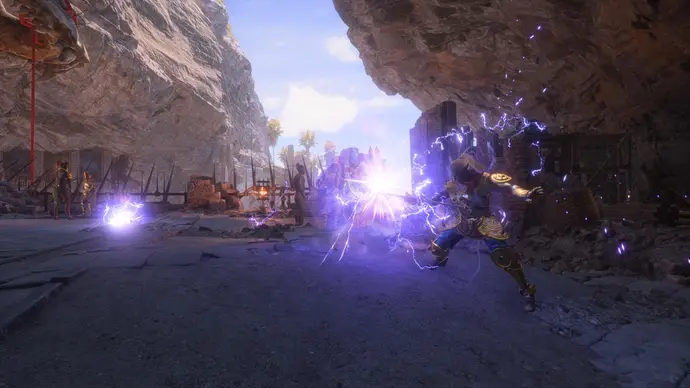
Of the three starting branches you can work toward, we recommend making Chain Lightning and Fire Wall your earliest priorities. Chain Lightning is a powerful strike attack that automatically targets multiple nearby enemies, applies Shocked - which deals an equal amount of stagger damage - and inflicts Overwhelmed. Overwhelm causes enemies to take extra stagger damage as well, so Chain Lightning is an easy, excellent way to prime tougher foes for a Takedown.
Grab Perfect Cast when you can, as it greatly increases the power of your light attacks when timed just right.
Fire Wall's usefulness is more situational, but it does have its uses. As the name suggests, it creates a horizontal wall of flame that lingers for several seconds, damages foes who come into contact with it, and inflicts burning, which causes even more fire-aligned damage over time. The problem is that most enemies are keen on following you around, so your target is often likely to just take damage once or even be out of range by the time you finish casting. However, with ranged attackers - who often stand still - and larger enemies, including bosses, Fire Wall works much more effectively.
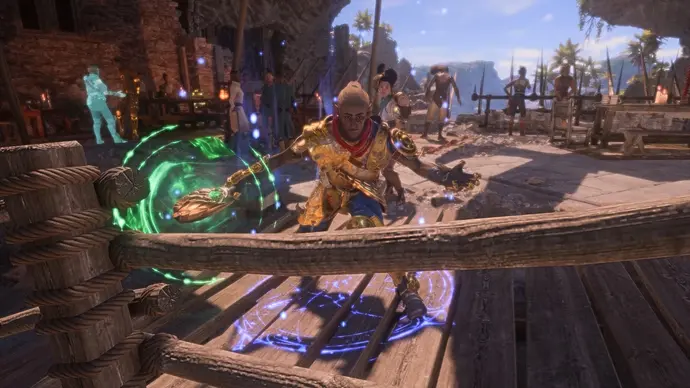
The most important reason to unlock Fire Wall, however, is to start progressing up the Sustain branch toward the Mourn Watch section. Even if you're not keen on the Death Caller specialization, unlocking Trait: Channeled Thoughts is essential for any Mage build. Channeled Thoughts lets you hold the guard button while you're using your stave and press the light attack button to recharge mana quickly. There's no limit on how often you can use this trait, so assuming enemies aren't attacking you at the time, you can feasibly cast, recharge, and repeat continuously.
The most efficient route to Channeled Thoughts takes you through the Degrade passive, which increases damage you deal against enemies with Primers and Afflictions. Primers are statuses such as Sundered, while Afflictions are any ailment that deals damage over time, including burning and necrosis.
Grab the Imbued Duration passive to apply shocking status to your weapons after a detonation, and then unlock Corrupted Ground. This is a necrotic spell that applies Weakened and deals additional necrotic damage while enemies stand in its broad area of effect.
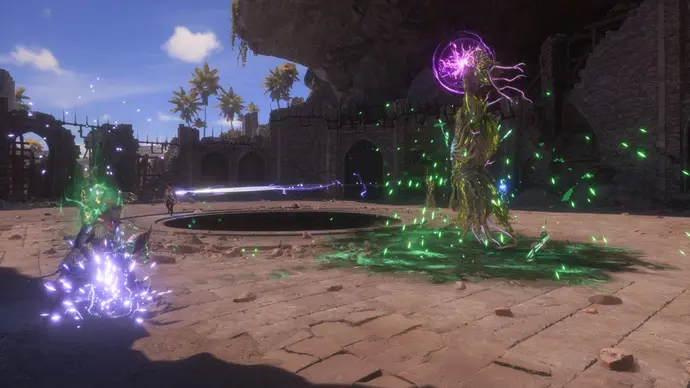
Take the Insidious Rot passive if you plan on using necrotic spells or Arcane Defiance if you need extra resistances, and then unlock Channeled Thoughts.
From here, you could make your way down toward Meteor in the Sustain group - a useful area spell, but one that enemies can easily dodge between the time you cast and the time the meteor appears. If you want a powerful fire skill that's easier to use, stick with the starting Arcane Shot ability. Get the Inner Focus passive near Meteor to gain 25 percent more mana after landing light attacks. You should be at Level 20 by now and can unlock your specialization, but the Mage's core clusters still have a lot to offer.
Once you unlock your specialization of choice, such as Death Caller, you'll still have plenty of skill points left to spend by the time you reach your maximum level. We've put together some suggestions for additional skills that help augment your build and that work with any specialization.
Start in the Burst group near Chain Lightning and unlock some of the passives around there, such as Precision Strikes and Shocking Strikes, which upgrade all strike-aligned abilities, including Chain Lightning. We're headed toward the Crow cluster next, by way of Tempest, but unlock the Energy Burst passive when you can. It increases fire damage when you use an electric skill and electric damage when you use a fire skill.
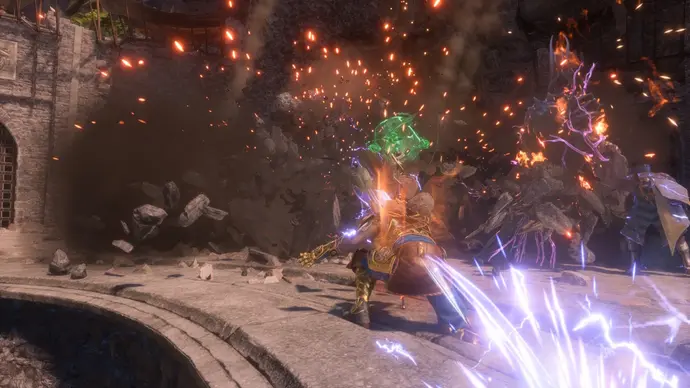
You're free to leave Tempest unlocked if you want, since its usefulness is limited compared with our next major skill. Do unlock the passives around it, though, to recover mana when you defeat an enemy, increase shocked stacks, and increase takedown damage. Grab Shocking Nexus, then make your way left toward the Crow cluster next. Storm Surge is your next major skill, a powerful electric attack that inflicts Overwhelm and damages enemies in front of you, which is most of them, most of the time.
By now, assuming you've unlocked all the skills in your specialization, you should have between five and 10 points left over. Use them to unlock passives in the Crow, Sustain, and Burst sections to help augment your main skills even further.
The weapons you bring are less important than the skills you use, and a good general rule to follow is that you should always upgrade to the weapon that deals more damage. The follow-up rule is that your stave's element and orb-and-dagger's elements should never match. It's impossible to predict enemy weaknesses ahead of an encounter, so there's no point sticking with an underpowered weapon on the off chance it might exploit an enemy's elemental weakness. However, if you vary the elemental alignment of your weapons, you can pretty much guarantee you'll have at least one way to get around resistances.
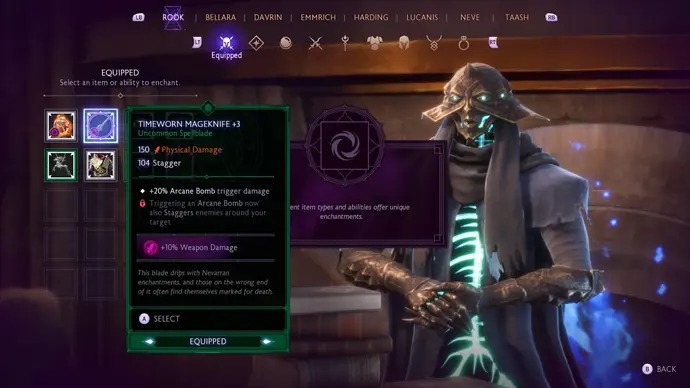
While you're free to pick any weapon alignment you like for a general Mage build, we rather like using Flamebranch. In addition to potentially causing the burn effect on enemies, its passives increase Mana regeneration and restore two Mana when you hit a burning enemy. We also recommend the Thunderclap orb, an electric weapon with high stagger - a nice pairing for the shock effect - and passives that deal increased damage to enemy barriers while preventing them from regenerating barriers.
Your mage knife always deals physical damage by default, so picking a good one means finding useful passives. Timeworn Mageknife is one of our favorites, as it increases Arcane Bomb damage and causes stagger when an Arcane Bomb triggers. However, the Spellcaster's Stiletto from Treviso's merchant is also useful, as it buffs your Mana regeneration and increases your defense.
Finally, it's worth keeping an eye on red-coloured weapons as the perks they hold may suit your build. Don't forget - these weapons can be enchanted, but not upgraded.
Mage armor in Veilguard all has the same basic set of functions - improving your defense and increasing how much damage your abilities deal. Like with the Mageknife, passives are what matter the most here, though finding heavy armor with high defense is also a wise idea. You can get the Casings of Fortune heavy armor from the Hall of Valor, which grants you high defense and decent ability damage, and its passives increase how much damage your companions deal. If you don't mind sacrificing some defense, though, you'd also do well with Jumper's Deft Leathers, which you can find in Arlathan and buy off Veil Jumper merchants. It increases your ability damage even more than Casings of Fortune, and it provides a Mana increase as well.
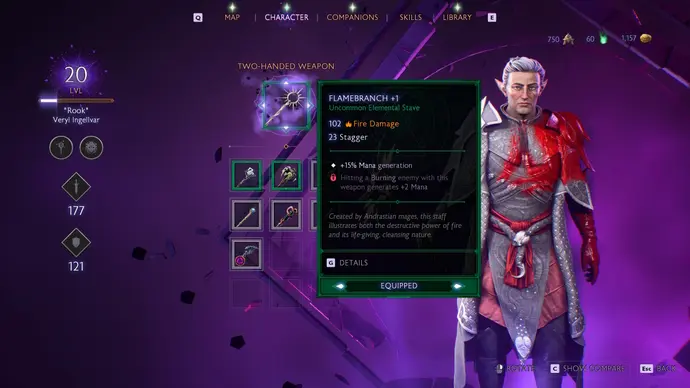
For your helm, we recommend Carastes Double Hat, the same as we did for the Death Caller specialization. The double hat increases Mana regeneration and adds an extra 25 percent stagger damage when you use an ability. Since this build prioritizes lightning abilities that inflict stagger damage anyway, this combo should make it much easier to set up takedown attacks.
Finally, you'll also want to check the perks of any unique red-coloured armor you collect as they could fit your build. Keep in mind these armor pieces can be enchanted, but not upgraded.
Glacial Talus is a useful ring for any Mage build, as it restores Mana when you defeat an enemy and, if you unlock its second passive, increases your Mana regeneration overall. You could pair that with the Paragon's Knuckle ring, which grants you two sizable defense boosts.
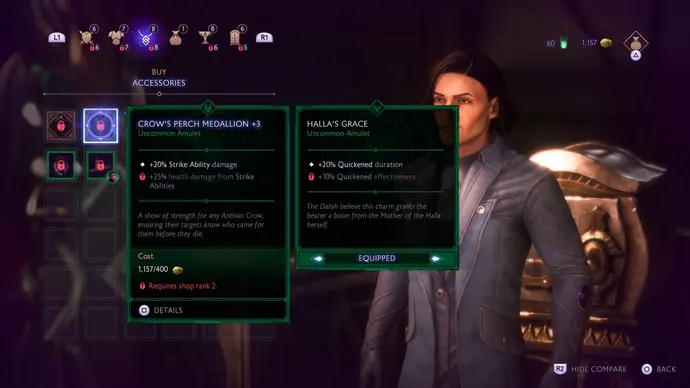
Since this build uses Strike abilities, we recommend grabbing the Crow's Perch Medallion, which you can buy from Treviso's Crow merchant. It boosts the power of Strike abilities and increases how much health damage they deal. Finally, for your belt, an excellent choice is the Hardbitten Belt from the Hall of Valor merchant. In addition to its high healing stat, it applies stagger in an area around you when you use a potion, and when you unlock its second passive, it'll increase the potion's area of effect.
Finally, like the red-coloured weapons and armor, it's always worth checking any red accessory you collect. These perks may be useful in your build and, while these accessories can't be upgraded, they can be enchanted.
Runes are flexible in Veilguard, but the Overflow rune works well with the Hardbitten Belt by increasing the number of potions you have and automatically triggering your active potion's effect.
For your other two slots, we recommend:
The best enchantments will depend on what weapon you're using at the time. Before reaching the keeper's fourth rank, consider putting +20% armor damage on your dagger, since its heavy attacks deal increased armor damage anyway. Your stave and orb can take the increased damage modifiers.
Rank four enchantments are mostly aligned with elements, except the Arcane Bomb Trigger one, which should replace Armor Damage on your dagger. It boosts how much damage you deal when you detonate a stack of three Arcane Marks. The other elemental enchantments may or may not be useful to you, depending on the situation, but don't hesitate to apply additional elemental damage to see how it works.
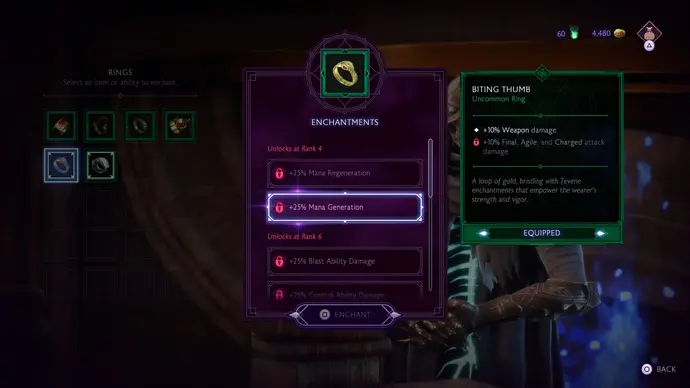
Put +50 Armor Damage on most of your skills to wear down tough foes faster. Stagger damage is also a good idea for electric skills, such as Tempest.
Of the rank four enchantments, Ultimate Generation and Healing Received are your best bets for your armor and helmet. Ultimate energy takes a long time to generate on its own, so every bit helps. If you're finding that you recover enough health from a single potion or ally ability, consider sticking Ultimate Generation on your helmet and armor to boost Ultimate energy even further. Rank eight enchantments are fairly generic - a 10 percent defense or health boost, for example - so you're fine to ignore them.
Veilguard gives you some strong enchantment options for your accessories. You can enchant your amulet to increase your abilities' ailment damage or even get an extra potion. Extra Potion is our top pick, since it frees your companions to use other skills.
For rings, put Mana Regeneration on both until you unlock higher ranking enchantments. Then, put either Projectile Damage on one or, at rank nine, +50 mana.
Good luck playing as a mage in Dragon Age: The Veilguard!